|
||||||||||||||||||||||||||||||||||||||||||||||||

|
||||||||||||||||||||||||||||||||||||||||||||||||
 |
||||||||||||||||||||||||||||||||||||||||||||||||
|
|
||||||||||||||||||||||||||||||||||||||||||||||||
|
|
Attributes of the Lord,
|
|||||||||||||||||||||||||||||||||||||||||||||||
|
|
Allah - there is no deity except Him. To Him belong the best names. (20:8)
The greatness and beauty of the names of Allah SWT cannot be emphasized enough. Allah SWT, His blessed Prophet SAW and our righteous predecessors have all stressed on the importance of comprehending and living His (SWT)’s divine attributes. Ibn Abbas RA said that everything has a pillar and the pillar of this deen is the conviction in la-ilaha-illal-lah (There is no one worthy of worship except Allah); The pillar of la-ilaha-illal-lah is Qur’an; the pillar of Qur’an is Surah Al-Fatiha; The pillar of Surah Al-Fatiha is Bismillah ir Rahman ar Raheem (I begin with the name of Allah, the Merciful, the Kind)—meaning the names of Allah SWT. |
Imam Shafi'i is reported to have said that Allah SWT summarized all the messages He revealed to mankind in His own names. Ibn Qayyim Al-Jawziyya’s book, Miftah Dar As-Sa'adah, can be summarized in the following sentence: “You will never be a believer until you have steadfastness with the names of Allah SWT.”
We know the famous hadeeth of RasulAllah SAW where he said:
In this article, by the will of Allah SWT, we will explore the real meaning of knowing Allah SWT and His attributes; and how this affects the relationship between the Lord and His slaves.
I once came across a quote somewhere that quite accurately describes the situation of the Muslim Ummah today. It read, “One reason so few of us achieve what we truly want is that we never direct our focus; we never concentrate our power. Most people dabble their way through life, never deciding to master anything in particular.”
 |
Muslim Ummah today is running into two major issues: Al-Ghuloo wat-Takhseer. Al-Ghuloo is to have rigidity to the point that it can break you. Prophet Muhammad SAW has warned us against ghuloo in deen which destroyed the earlier people. At-Takhseer is the other extreme approach where people discard all the rules and regulations and make deen a thing of insignificance. This is the practice of some deviated sects today who promote innovations and disregard the essence of Islam. Both extremes are wrong; Allah SWT has created us as ‘ummat-wasata'--the middle nation; the middle in here refers to the implementation of |
Both of these extremes are caused by confusion among Muslims which is usually the result of not being focused on the message and what is required of us. Everything in Islam has a purpose; behind this purpose there are regulations; behind regulations there are manners; the implementation of manners needs wisdom; and wisdom needs rahma (mercy). They are interconnected like links in a chain where if any of the links are broken then the entire chain is scattered.
The purpose of knowledge of Islam is to give us manners, character and good behavior to carry the message of Islam to humanity. However, Muslims today are deprived of these qualities on every level, whether it is personal, familial, communal or global. Unfortunately we lack these characteristics even at our most sacred and revered places like masajid or even at the Haram. We have lost a lot of adab (manner), which is a reflection of lack of Iman and proper understanding of the deen.
In this article, we will explore the importance of focusing our faculties and building concentration in order to have a fruitful relationship with Allah SWT.
|
Allah SWT says in the Qur'an:  And I did not create the jinn and mankind except to worship Me. (51:56)
Our venerable scholars have interpreted ‘worship’ as to know Allah SWT and to understand Him. This is the reason we are created and thus by default this is the command of Allah SWT for us. But how can we love, worship and build a relationship with someone we don’t know? This is where the importance of knowing the names of Allah SWT comes in. Allah SWT summarized most of the knowledge about Him that He wants |
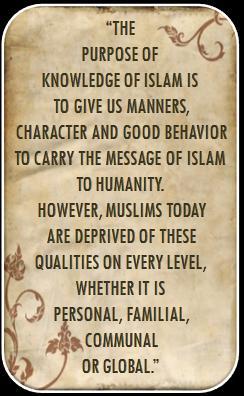 |
However, in the middle of cyclone of dunya, religion has become very insignificant and devalued for people—including Muslims. Even, "religious" Muslims are happy with some halal and haram, salah, fasting or some other aspects or rituals of Islam and are content with just this much. Therefore, we are in reality deprived of the actual depth of this religion.
We need to re-learn Islam as a ‘message’ from the Creator for all of humanity. We have to learn that Islam is the status of the heart and a Muslim is required to surrender to the will of Allah SWT at any given time. His thinking, desires, emotions, goals, ambitions—all should be according to Islam. This requires a person to be focused, concentrated, and strong enough to not only differentiate between distractions and rightful interests, but be able to instantly make the correct decisions.
Power of focus and concentration is not a new phenomenon. Yoga and Zen are well known concentration exercises and there are amazing things that can be achieved through that. Martial arts and the almost super human accomplishments of its artists are known examples of this phenomenon. This ability to focus and concentrate is an integral part of our deen. No messenger and prophet received guidance and revelation without first mastering the ability to focus his thinking. Focus of thinking on the Creator.
Absence or lack of this focus will result in absence of divine power and energy in a person. In this high speed life, we are unable to have pure and clear thinking. A |
person always has so much to think about that clearly thinking about one topic becomes impossible. And the inability to focus with Allah SWT results in preoccupation with dunya (world), Shaytaan (Satan), nafs (carnal desires, ego); therefore the distractions in life keep increasing.
While studying the lives of the prophets and messengers we notice a pattern of them spending time in seclusion before receiving the revelations from Allah SWT. It is this seclusion that is supposed to develop clear thinking and concentration which spiritually prepares the person to carry the burden of conveying Allah SWT’s message to the masses. |
Allah SWT tells us about Ibrahim AS’s vision of guidance in the following words:

So when the night covered him [with darkness], he saw a star. He said, "This is my lord." But when it set, he said, "I like not those that disappear."
And when he saw the moon rising, he said, "This is my lord." But when it set, he said, "Unless my Lord guides me, I will surely be among the people gone astray."
And when he saw the sun rising, he said, "This is my lord; this is greater." But when it set, he said, "O my people, indeed I am free from what you associate with Allah.
Indeed, I have turned my face toward He who created the heavens and the earth, inclining toward truth, and I am not of those who associate others with Allah." (6:75—79)
|
It was the pure thinking of Ibrahim AS and his ability to focus on the message of Allah SWT and his slavery to Him that brought him to the rightly guided conclusion. What prevents people from reaching this purity? Allah SWT answers that in Surah Al-Mutaffifeen:  No! Rather, the stain has covered their hearts of that which they were earning.
No! Indeed, from their Lord, that Day, they will be partitioned. (83:14—15)
It is people’s own actions that prevent them from reaching the guidance from their Lord. If they |
 |
Allah SWT says in Surah TaHa:

Here Allah SWT is reminding His slaves that if they forget to remember Him, they will be blinded in this life and the hereafter. Blindness in this world doesn’t need to be physically manifested—rather it is blindness from doing and gaining things of real benefit and value.
 |
Thoughts, ideas, and ability to communicate and act upon them are what differentiate humans from all other creation. Allah SWT gave humans the faculty of thinking which is what earned them the level of Ashraf-ul-Makhlooqat or the Exalted Creation. The best form of gratitude towards Allah SWT for giving us this high status is to utilize this thinking towards Him, to ponder over His gifts and the unlimited amount of mercy He has showered upon us. The more we think, the more our hearts |
Allah SWT says in Surah Ra'd:

In this stressful world, peace of mind and heart is an achievement worth striving for. The more one tastes this peace, the higher the desire for it becomes and the more a person thinks about it. Therefore, our thoughts and remembrance of Allah SWT are actually intertwined.

This leads us back to the purpose of our creation:
- Remembrance of Allah SWT;
- living for Him;
- living for the propagation of the message of Islam until one is truly the ambassador of Allah SWT and His deen.
|
It is because Muslims themselves have lost the message of Islam. Islam has become an empty shell of laws—of haram and halal, while the fruit of spirituality has been lost. We have become so shallow that half a billion worshipping Muslims are unable to produce any substantial difference whereas a companion of the Prophet Muhammad SAW could change any condition with his/her individual du'a. This situation reveals that we lack the understanding of the purpose of our creation as well as the creation of the earth, of Iblees and his powers. Islam teaches us that Allah SWT has the ultimate control; therefore the more we surrender to the One in control the more we are in control, and the more we get away from Him the more we are weak and lose control of situations in life. |
 |


Everything in creation points towards the existence of the creator. The Qur’an revealed during Prophet Muhammad (SAW)’s time in Makkah (known as the Makki Qur’an) talks mostly about Allah SWT and His signs in His creation.
When you look at the literary structure of the word Allah in Arabic, it starts with 'alif'. If you remove 'alif' it becomes 'lillah' which means ‘towards him’. If you remove the first laam, it becomes lahoo which means ‘for him’. If you remove the next laam, it becomes huwa which means ‘him’. So, at any given time, all states of affairs are pointing towards Him SWT. Thus, the name of Allah in itself is one of the best dhikr to perform as every letter reminds one of Him SWT.
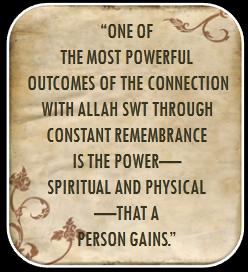 |
Prophet Muhammad SAW said: "The best of my sayings and of the sayings of all Prophets before me is: There is no god but Allah alone, without partner, to Him belong all sovereignty and glory, and He has power over all things." (At-Tirmidhi).
One of the most powerful outcomes of the connection with Allah SWT through constant remembrance is the power—spiritual and physical—that a person gains. Once we lose our |
Allah SWT reminds us in Surah Hashr:

He goes on to remind His creation about who holds the power of everything in Surah Shu'ara:


All of these verses remind us of the Power of Allah SWT in our lives. Once we really focus and think, we can’t help but thank Allah SWT and praise Him for His graces and bounties upon us. The more we think and ponder over the greatness of Allah SWT the more we get to know Him, and the more we know Him the more we become closer to Him. Hence, we see that focus is the fountainhead of one’s achievement with his Lord SWT.
|
This relationship gives us adab or manners with Allah SWT, and one of the manifestations of this adab is that we don’t question Allah SWT about His doings while believing that He SWT holds the ultimate authority to question us. How can we question Allah SWT’s wisdom when we have such limited knowledge compared to Him? Angels, the pure creation of Allah SWT questioned Him when He decided to create Adam AS; they were concerned about the mischief humans would make on earth. Allah SWT |
 |
When Musa AS met Khidr to gain knowledge from him, Khidr reminded him of the power of Allah SWT in beautiful words saying that all human knowledge combined is like a drop of water in the ocean compared to the knowledge of Allah SWT.

Allah SWT has sent us on this earth with a very clear purpose which is to worship Him and exalt His name. This worship can be divided into three main categories:
- To follow the knowledge of Allah SWT.
- To follow His constitution (Qur’an), according to the teachings of His Prophet SAW.
- To implement this constitution until our lives become a reflection of it.
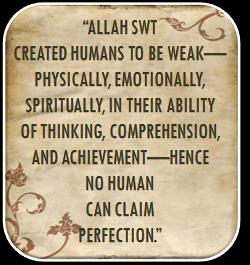 |
Along with giving us this clear purpose of our existence, Allah SWT also informed us about our enemy, Shaytaan, and what he did—basically warning us from following his footsteps. The two major diseases that were the roots of destruction for Iblees are:
|
Allah SWT has also mentioned the consequence of these diseases of the heart in the following words:

By His mercy, Allah SWT not only has informed us of the diseases that can cause such immense destruction, He has provided the cure and protection from them as well. Allah SWT has promised to protect the people who belong to the following categories:
- Ibaad-Allah (Slaves of Allah SWT)
- Al-Mukhliseen (The sincere ones)
- Al-Mutawakkileen (Those who rely on Allah SWT)
Allah SWT has created us with shortcomings as a trial in life and He has given us means to overcome this incompleteness in our souls. This is part of mujahada (struggle) every human has to perform in life in order to perfect his faith. Below is the list of imperfections in humans:
- Allah SWT has created every individual with some form of default weakness and he is supposed to struggle against it until he overcomes it. These weaknesses could be stinginess, anger, laziness etc.
|
 |
- Allah SWT created humans to be weak—physically, emotionally, spiritually, in their ability of thinking, comprehension, and achievement—hence no human can claim perfection. Only Allah SWT is perfect; we are in constant need of Him, whereas He does not need anything from anyone.
- Humans are by nature anxious and hasty. Allah SWT tells us in Surah Ma'arij:

Indeed, mankind was created anxious: When evil touches him, impatient. (70: 19-20)Humans are weak and lack moral strength to endure; they lack courage and strength of purpose and will; and overreact when faced with grief and challenges. They are selfish and are concerned with only their own advantage while overlooking others’ benefit.
- Argumentative (Jadl):

And We have certainly diversified in this Qur'an for the people from every [kind of] example; but man has ever been, most of anything, [prone to] dispute. (18:54)

Allah SWT has explained His revelations in the Quran to fit all times and circumstances and has expressed many parables in order to bring people out of darkness of disbelief. But man usually finds frivolous objections about most things and tries to find fault without good reason.
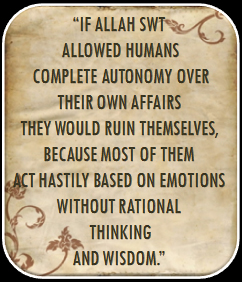 |
|
- Hastiness:

And man supplicates for evil as he supplicates for good, and man is ever hasty. (17:11)It is a mercy of Allah SWT that He decides our affairs and gives us only what is good for us. If Allah SWT allowed humans complete autonomy over their own affairs they would ruin themselves, because most of them act hastily based on emotions without rational thinking and wisdom.
- Stinginess. Allah SWT says in Surah Isra:

Say [to them], "If you possessed the depositories of the mercy of my Lord, then you would withhold out of fear of spending." And ever has man been stingy. (17:100) - Fakhr (Pride):
Allah SWT gives us the examples of Qaroon, Hamaan, Nimrud and others from earlier generations who exulted and believed in themselves over Allah SWT because of their wealth. Allah SWT tells us of their horrible end and goes on to explain what pride is in the following verse:

|
Take the example of a man who has been afflicted by some calamity and he turns to Allah SWT to alleviate it from him. Allah SWT listens to his prayers and removes the calamity; but instead of showing gratitude and dedicating himself to his Lord, the person forgets about Allah SWT and goes back to self exultation. Another form of pride is when a person receives blessing from his Lord and believes it to be his right and gloats about it; and if Allah SWT trials him, he becomes ungrateful and complains. |
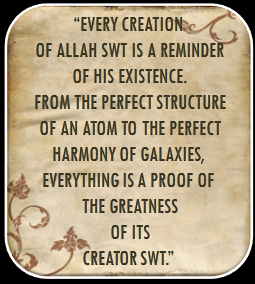 |
Allah SWT says in Surah Fajr:

This attitude shows that the person lacks humbleness and humility to receive the decree of Allah SWT and be content with it. Allah SWT gives whom He wills and takes from whom He wills. A slave has no right to question his Lord.
- Rebellion against destiny and the decree of Allah SWT in both giving and taking. Allah SWT says in Surah 'Alaq:

No! [But] indeed, man transgresses. (96:6)He goes on to say in Surah Isra:

And when We bestow favor upon the disbeliever, he turns away and distances himself; and when evil touches him, he is ever despairing. (17:83) - Ingratitude:

And He gave you from all you asked of Him. And if you should count the favor of Allah , you could not enumerate them. Indeed, mankind is [generally] most unjust and ungrateful. (14:34)
 |
|


Allah SWT does not like those who despair from His mercy. He SWT says:

And when We bestow favor upon the disbeliever, he turns away and distances himself; and when evil touches him, he is ever despairing. (17:83)

He said, "And who despairs of the mercy of his Lord except for those astray?" (15:56)
All of the above mentioned negative characteristics can be overcome with strong Iman in Allah SWT. The stronger the Iman becomes and closer the person gets to Allah SWT, the weaker these tendencies become; and vice versa.
|
Qur'an is the cure for the illnesses of the soul. We need to elevate Qur'an above the level of just a book of recitation and of receiving blessings, and start taking it seriously as a message from our Lord who knows the deepest, darkest secrets of our hearts. Once we start seeking guidance from the Qur'an, the door of receiving knowledge from Allah SWT will open and we will be able to develop qualities that bring the blessings and victory from Allah SWT. This is the path that the companions of Prophet SAW took and history is a proof of the results that they achieved. |
 |
There are two blessed qualities that are granted to people as fruits of the knowledge of Allah SWT that they have acquired.
- Poverty to Allah SWT:
It is the status of the heart when one realizes that without the help of Allah SWT he is nothing. It is to recognize the fact that Allah SWT is the owner of all qualities; therefore even weakness in personality is not really a weakness if it leads a person closer to Allah SWT by asking Him for strength. He SWT has the ability to take any weakness and convert it to strength.
Therefore, weaknesses such as sins, temptations, desires and/or lack of any bounty such as beauty, money, status, or physical ability are in reality opportunities of gaining quality since they humble a person and cause him to turn to Allah SWT.
At this point along with realization of his weaknesses and strengths, the person also gains greater qualities. When he lives with constant recognition of his weaknesses and the bounties of Allah SWT on him, he develops a balanced personality where at any given time he is either in the state of patience or gratitude to Allah SWT.
 |
|
-
The weakness is given to us to keep us humbled, and at the same time Allah SWT has provided its antidote for us. These are His names through which we can reach Allah SWT and ask Him to alleviate our spiritual illnesses and weaknesses and replace them with His qualities. For example, if a person is stingy, he can call Allah SWT with His attribute of generosity until this quality becomes part of his personality.
Imam Ghazali RA is reported to have asked: "What is the value of listening to something when you don't understand the language?"
We can make this question relevant to our topic by rephrasing it thus: What is the value of all the Islamic knowledge such as grammar, tafseer, hadeeth, and fiqh if it doesn't cause us to get closer to Allah?
What good our elaborate Islamic decorations and beautiful masajid are going to do if we don't have the message of Islam in our hearts?
Allah SWT cursed Bani Israel for their knowledge and compared them with donkeys carrying books. It is not the quantity that Allah cares about, it is the quality. Abdullah Ibn Mas'ud once talking to the Taba'een (generation after the companions) said:
If this is what Abdullah Ibn Mas'ud felt about the Taba'een, then what would he say about us?
|
Imam Ghazali has informed us that the knowledge of any subject has many levels. Just as we cannot talk about a gourmet meal with a child who only knows the taste of milk, how can we give high level knowledge of Islam to a person who doesn't even know Allah SWT, and has not internalized the true magnitude of his relationship with his Lord? The point of the article is this: We have lost the message of Islam! We are emotionally and physically asleep. And a sleeping or barely awake person is not only vulnerable, he is prone to making wrong decisions and acting in a harmful way. |
 |
This in Islam is known as ghafla which can be loosely translated as the absence of thinking, heedlessness, and weakness of Iman. Even if the guidance comes, unless we are fully awake and receptive, we will miss it. We can't afford to rest in our spiritual journey. If we rest, we become prone to shayateen attacks and drift further away from Allah SWT.
This state of heedlessness is also indicative of the next stage which is calamity from Allah SWT in order to wake Muslims from their slumber.
It is time to take our deen seriously and embark on the path of self correction and spiritual awakening. Seclusion, breaking the nafs, abstinence from luxury, and remembrance of Allah SWT are means of waking the human heart and soul.
- The first level of getting closer to Allah SWT is to call Him with absolute belief.
- The second level is when you start feeling the sweetness in the remembrance of Allah and start building a relationship with Him.
- The next level is to nurture the relationship and do everything in your power to try to further extend this relationship.
As we mentioned earlier, our modern lifestyle does not allow us the luxury of remaining focused and calm long enough to even think without interruptions and distractions. At a time like this how badly do we need peace, tranquility, focus, and calmness in order to benefit from our lives? We should do our utmost to gain this peace and tranquility which can only be achieved through the remembrance of Allah SWT:


If You Liked This Article, Please Download it, Print it, and Share it:
Just 'Right-Click' on the button of your choice and choose 'save target as'







